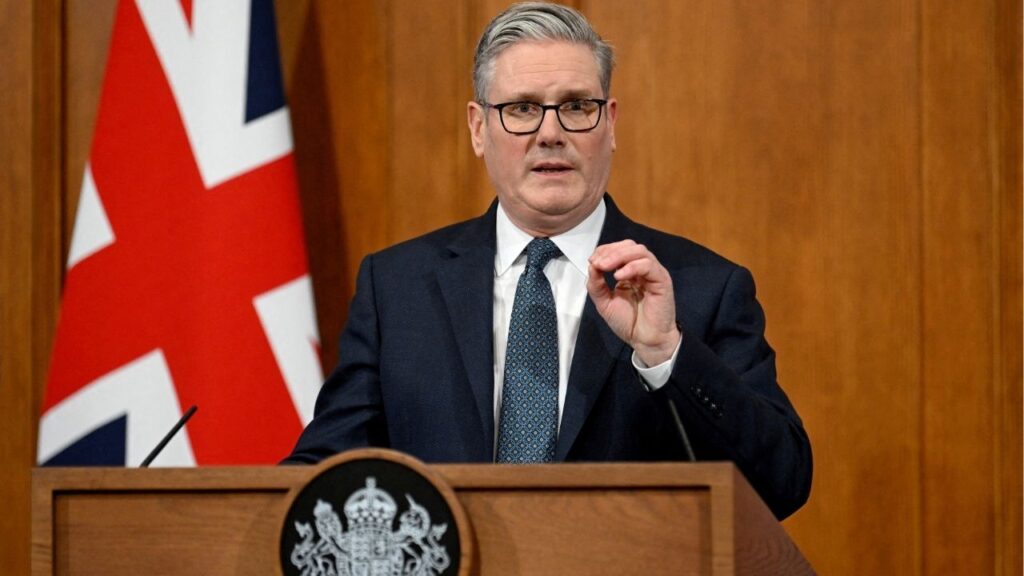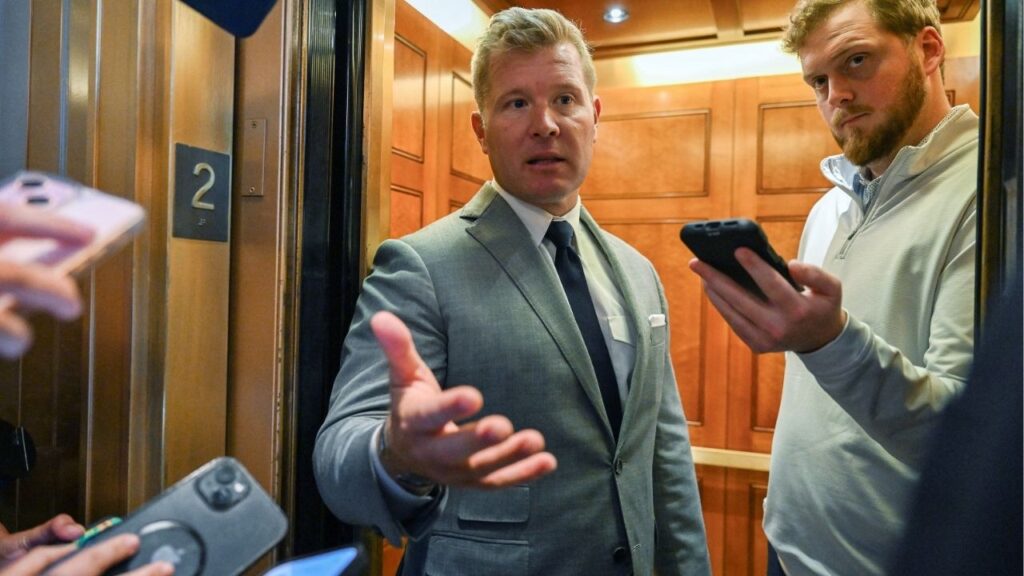Share
Less than three months ago came the first reports of cases of pneumonia related to a virus first detected in Wuhan, China. The outbreak of the virus that causes COVID-19 has caused unprecedented disruptions that have brought an unparalleled shock to the global economy.
Following are developments Friday related to the outbreak, efforts by governments to stabilize their economies, companies that must navigate through an altered landscape, and the millions of people affected.
Grounded
The lowest number of passengers ever recorded at U.S. airports is being reported by the Transportation Security Administration. Nearly 624,000 people passed through its outbound checkpoints on Thursday, the TSA said. That compares with 2.4 million on the same day a year earlier. It’s the lowest number of outbound passengers ever recorded by an agency created in November 2001 in the wake of the Sept. 11 terrorist attacks.
The CEO and labor leaders at American Airlines wrote to Treasury Secretary Steve Mnuchin and congressional leaders Friday imploring them to quickly approve aid for airlines or else workers will lose their jobs. The company says it will accept “appropriate conditions” on government aid.
Frankfurt airport operator Fraport AG has put 18,000 of its 22,000 employees on shortened schedules, saying that “traffic has come almost to a halt.” Wages will be partly covered by the German government’s short-work policy. The company said it would add payments to ensure at least 75% of pay. Fraport also took its northwest landing runway out of service. It will instead be used to park unused airplanes.
An air traffic control supervisor in Indianapolis tested positive, the Federal Aviation Administration reported. Some work areas were closed Thursday night, but the center remained open Friday while crews cleaned work areas. It’s the third FAA facility affected by COVID-19. Earlier this week, airport towers in Chicago and Las Vegas closed temporarily, leading to hundreds of canceled and delayed flights.
American Airlines is initiating cargo-only flights between the US and Europe. FedEx and UPS were expecting to absorb a greater share of cargo typically carried by commercial airlines, which have severely cut capacity.
Air Canada is laying off more than 5,000 flight attendants, about 60% of that staff, according to a union official, as the country’s largest airline grounds its planes. Wesley Lesosky, who heads the Air Canada component of the Canadian Union of Public Employees, said the layoffs include 3,600 Air Canada employees, as well as 1,549 at Rogue, Air Canada’s discount carrier. The layoffs will take effect by April. Air Canada says the layoffs are temporary. The Montreal company said earlier this week that it will suspend the majority of its international and U.S. flights by the end of the month.
Airlines are continuing to push for cash – not just loans – from taxpayers to cope with the virus outbreak. Faye Malarkey Black, president of a trade group for smaller airlines, said Friday that Senate Republicans’ proposal for $58 billion in loans “does not help save the regional airline industry or our 70,000 employees.” She said regional airlines, which operate flights under brand names Delta Connection, American Eagle and United Express, won’t survive without direct financial aid or unsecured loans in which amounts spent to keep workers are forgiven. A White House proposal called for $50 billion in unsecured loans but no grants. Some lawmakers and critics want limits on a bailout for airlines that made tens of billions in profit over the previous decade and spent much of it on shareholder dividends and buying back their own stock.

Help Needed
With outbreak-related layoffs expected to surge, at least two major retailers are hiring in a big way. Walmart, the nation’s largest retailer, said late Thursday that it plans to hire 150,000 U.S. hourly workers for its stores and distribution centers through the end of May as online orders surge with households stocking up. The jobs are temporary, but many will become permanent, said spokesman Dan Bartlett. He said that the company is reaching out to industry groups in the restaurant and hospitality industry, both of which are getting slammed by lockdowns and travel bans. Amazon this week said it would hire 100,000 people across the U.S. to keep up with a crush of orders hires.
Target Corp. said Friday it will give a $2 an hour wage increase to its 300,000-plus workers who have been scrambling to help customers. The pay bump will be effective at least through May 2. It’s also begun offering workers who are pregnant, 65 years old or older, or who have underlying health risks, access to paid leave for up to 30 days. Target joins Amazon and Walmart which are offering extra incentives like cash bonuses or a temporary wage bump as they try to manage the crush of customers while simultaneously looking to keep their workers happy.
Not Hiring
Canadian Prime Minister Justin Trudeau says his government has received 500,000 applications for employment insurance compared to just 27,000 for the same week last year. Trudeau says they are receiving a historic number of calls from concerned Canadians amid the pandemic. This week, the U.S. reported the number of Americans filing new claims for unemployment benefits surged by 70,000 to the highest level in more than two years.
The British government has unveiled a massive economic support package to protect workers through the shock of the coronavirus pandemic. For the first time, the government may help pay wages in the private sector.
The so-called coronavirus job retention scheme will involve companies applying for a grant 80% of the salaries of these retained workers, up to 2,500 pounds per month. Companies will be able to add to this if they wish. Sunak also announced further support measures for those who have lost their jobs and for those who are self-employed. A series of taxes, including those on sales, have been deferred while a business interruption loan scheme, worth 330 billion pounds, is now to be interest free for 12 months.
Close to Home
The chairman and CEO of Marlboro-maker Altria Group has contracted COVID-19. The company said in a regulatory filing that Howard Willard is on medical leave. Chief Financial Officer William Gifford, Jr. will lead the company in Willard’s absence. The company is also suspending operations at its plant in Richmond, Virginia, for two weeks after two employees contracted the COVID-19 virus. Some domestic operations at its John Middleton Co. subsidiary will also be suspended due to supply chain issues. The tobacco giant said employees will continue to receive regular pay during the two-week shutdown.
NBC News reported Friday that an employee who worked at the company’s 30 Rockefeller Plaza headquarters in New York has died from COVID-19. According to his wife, Larry Edgeworth had other health issues before contracting the coronavirus. Edgeworth died Thursday.

Firewall
Companies across almost every sector are raising cash to ride out the outbreak.
Kohl’s has fully drawn its $1 billion unsecured credit facility. The department store chain, based in Menomonee Falls, Wisconsin, is slashing inventory and expenses. Kohl’s Corp. has closed its 1,100 stores for at least the rest of the month. It and many other major chains are temporarily closing stores to curb the spread of the coronavirus.
AT&T cancelled a $4 billion accelerated stock buyback program scheduled for the second quarter. The company said in a regulatory filing that it’s also canceling any other stock repurchases so it can have financial flexibility and continue to invest in its business. AT&T said it’s currently unable to estimate the impact the virus will have on its financial and operational results.
Future Unknown
Coca-Cola Co. no longer expects to reach previously set financial goals for the year. Coke said in a regulatory filing that restaurant closures, suspended NHL, NBA and MLB seasons, reduced travel, social distancing, and more people working from home is straining operations. The Atlanta company said that it cannot reasonably estimate the negative impact the virus will have.
Kohl’s withdrew its full-year and first-quarter forecasts. Several other chains like Nordstrom and Abercrombie & Fitch have also withdrawn their guidance given so much uncertainty.
Factories Go Dark
Thousands of businesses have ordered employees to work remotely. It’s obviously not an option for a number of sectors and the impact on heavy industry has been immense. All major U.S. automakers, including Tesla, have shut down their factories.
Mercedes-Benz is one of the latest automakers to announce that it’s pausing production. The company says Friday its auto plant in Tuscaloosa, Alabama, and a van factory in Charleston, South Carolina, will start to wind down production Monday, for at least two weeks. The company says it’s following recommendations of authorities and that it will monitor the situation and “take further measures as required” to help contain the spread of the virus.
Jaguar Land Rover is suspending production at its U.K. plants. The company said in a statement that production will be temporarily halted over the course of next week, with the intention of resuming on April 20, subject to a review of the “rapidly-changing circumstances.”
Though it is shuttering its plants in the U.K., its manufacturing plants in Brazil and India continue operating. The company’s joint venture plant in China reopened around a month ago. Des Quinn, an official from the Unite union, said as a result of previous agreements with the company workers will continue to be fully paid.
Other firms including BMW, Honda and Toyota have already halted production in the U.K.
Volvo Cars said Friday that its Swedish and U.S. plants will close on Thursday and will remain closed until mid-April. Office employees are being ordered to work remotely with reduced hours. The company said it reopened four manufacturing plants in China earlier this month after an extended closure.

Streaming Logjam
YouTube is reducing its streaming quality in Europe as more users self-isolate at home.
The company, owned by Google, said Friday it would “temporarily default all traffic in the U.K. and the EU to Standard Definition,” instead of high definition. The measure will be in place for 30 days and users will still be able to manually adjust their video quality.
YouTube follows Netflix, which said Thursday that it expects the video bit rate reduction to cut its European traffic by a quarter.
The companies are responding to a call by the European Union’s internal market commission, which urged streaming services and network operators to help prevent network congestion as more people use their home internet connection to work or learn remotely or for entertainment.
iHoarding
Apple is allowing people to buy only two iPhones online. It appears to be attempting to prevent the large purchase and resale of its technology at higher prices. Apple is facing a potential demand decline and supply chain issues due to the virus pandemic spreading across the globe. It closed all retail stores outside of China to help fight the spread. Apple did not return a request for comment Friday. Apple announced a new iPad Pro and MacBook Air on Wednesday. It made no mention of new iPhones during the announcement.
RELATED TOPICS:
Categories

UK Says Drone Attack on Cyprus Base Not From Iran

Britney Spears Arrested for DUI, TMZ Reports


















